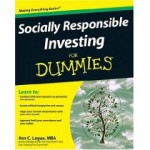 A friend of mine serves on the sustainability committee of his alma mater, a large state university. At a recent meeting, he suggested that the committee look into sustainable investments for the endowment, and the committee representative from the board of trustees got upset. My friend asked me if I could send him information that shows that social investment outperforms regular investment.
A friend of mine serves on the sustainability committee of his alma mater, a large state university. At a recent meeting, he suggested that the committee look into sustainable investments for the endowment, and the committee representative from the board of trustees got upset. My friend asked me if I could send him information that shows that social investment outperforms regular investment.
I had to tell my friend that I could not, because it does not. To the disappointment of social investing advocates, social investing does not outperform traditional investing. But, despite what many in the traditional investing business like to say, it does not have to underperform traditional investing. Pension funds have a legal obligation to place investment performance ahead of all other considerations, and that goes for Catholic hospital and labor union pensions with social investment restrictions. Many social funds outperformed in the financial crisis, but that was skewed by Islamic finance funds that would not invest in banks or other financial institutions.
I should add that most traditional investing underperforms the market to begin with, so these critics shouldn’t be so smug. If you can’t beat a cheap index mutual fund, with all of its tobacco companies and defense contractors, you should not be casting aspersions. I don’t say that lightly, either.
Social investment can match traditional investment performance and market performance if it is done correctly. Not everyone who invests socially does it well. The starting issue is that the definition of social or sustainable investing is not simple. Some organizations define it very clearly because they have an organizational mission to refer to. A lot of Catholic colleges and pension funds for religious orders will not invest in companies that market tobacco, make weapons, or provide anything that could be used for birth control or abortion. They have clear lines. It is hard to set those; gray areas emerge quickly. WalMart is one of the most environmentally responsible companies in the United States, but they are hardly a model employer. BP was an example of how an oil company could be environmentally responsible until the Deepwater Horizon spill showed that it was all a sham. At a big state-supported university, it would be especially difficult to build a consensus on what should and should not be in the endowment.
Here’s the other thing: an endowment has to invest its money somewhere. The trustees have a fiduciary responsibility to run the endowment in order to support the academic mission of the university, and everything else comes behind that. Is anyone prepared to give up a student scholarship or two for the sake of social goals? The two are not mutually exclusive, but it takes work to reconcile them.
The key is to identify what your true hot issues are and then find acceptable investments that have the same risk and return characteristics as the investments you want to replace. One firm that has done great work on this is a company that used to be known as KLD that has since sold out to an index firm called MSCI (which used to be Morgan Stanley Capital International.) Finding other investments creates more work and possibly raises costs to the investment staff, so that adds to the challenge. In general, funds that naively exclude alcohol, tobacco, pornography, and gambling stocks underperform unless the fund manager takes the time to find good substitutes.
I gave my friend several resources to help his research. The first is the National Jesuit Committee on Investment Responsibility. The Jesuits have been leaders in investing among the Catholic orders, and they are known for their intellectual approach to worldly issues. I sent him to two bibliographies of some of the academic research on performance.
I also suggested that my friend channel his energies into a proxy voting program. It’s a popular form of campus shareholder activism because it does not interfere with the investment process, and I wrote an article about it and other investment activism issues a few years back for University Business. One of the organizations I talked to is the Responsible Endowments Coalition, which gives students resources for addressing social investment issues.
All of this is a long way of saying, there isn’t an easy answer, because you have to balance a lot of issues to make social investing work in a large portfolio. It can work, though, if the parties involved work at it. I hope my friend can be the catalyst at his college.


